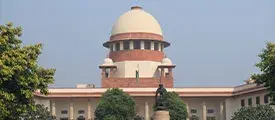Special leave Petition (SLP) under Article 136 of the Constitution of India
The Supreme Court of India has been given extraordinary jurisdiction under Article 136 of the Constitution of India. Under Article 136, the Supreme Court in its discretion may grant special leave to appeal from any judgment, decree, determination, sentence or order in any cause or matter, passed or made by any court or tribunal in the territory of India. This is called ‘Special Leave Petition’ (SLP).
In general, an appeal can be instituted before the Supreme Court of India from decisions of the High Courts (Articles 132 to 134). However, there might be some cases wherein justice and equity may mandate the interference of the Supreme Court. in such cases, the Supreme Court has been conferred with extra-dordinary powers under Article 136 of the Supreme Court of India.
The residuary provision under Article 136 vests in the Supreme Court the jurisdiction to entertain appeals by grant of special leave against any judgment or order passed by any Court or tribunals in the country. Under Special Leave Petition, the Apex Court has discretionary powers to ensure that there is no miscarriage of justice.
SLP in Civil cases and Criminal cases
Special Leave Petition in civil cases under Article 136 will not be granted unless there is a substantial question of law involved in the case or the issue in question affects the interest of the general public.
In criminal cases, the appeal by way of special leave will be granted by Supreme Court only in cases where the facts of the case showcase special and exceptional circumstances exist which evidence grave injustice, thereby warranting the Apex Court’s interference.
Click here for Supreme Court’s website.
Read more about SLP’s .






